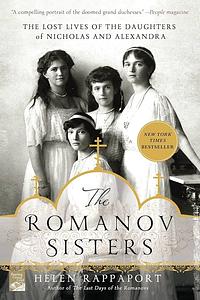You need to sign in or sign up before continuing.
Take a photo of a barcode or cover
informative
medium-paced
emotional
informative
sad
slow-paced
Well, I'm properly sad now... No matter how many times and how many ways I hear the story of this family told, it always hits me. This particular book tells it beautifully, paying special attention to the four sisters. It's absolutely heartbreaking to read about these girls, so different from one another, kind, naive, and full of life, knowing all along how all of this ended. Loved Rappaport's writing style—nothing dry about this non-fiction book, she really knows how to create an atmosphere and draw the reader into the story. I actually ended up tearing up during certain parts, which doesn't happen too often to me when I read.
The only negative I have, which isn't reflected in my rating because I felt like it would be unfair to the book itself, has to do with the narrator of the audiobook. Unfortunately, the narrator really struggled with Russian names and locations. She tried, I'll give her credit, she got some of them right, but as a native speaker I can tell you that some of these took me out of the book because they ended up being unintentionally funny. I ended up purchasing a physical copy and I'm so happy to have it!
P.S. OK, I have one more nitpick: there aren't nearly enough photos in the book. I expected photos, maps, letters... but really, the edition I have only has a small section with some photos in the middle of the book and that's it. Definitely a missed opportunity here.
The only negative I have, which isn't reflected in my rating because I felt like it would be unfair to the book itself, has to do with the narrator of the audiobook. Unfortunately, the narrator really struggled with Russian names and locations. She tried, I'll give her credit, she got some of them right, but as a native speaker I can tell you that some of these took me out of the book because they ended up being unintentionally funny. I ended up purchasing a physical copy and I'm so happy to have it!
P.S. OK, I have one more nitpick: there aren't nearly enough photos in the book. I expected photos, maps, letters... but really, the edition I have only has a small section with some photos in the middle of the book and that's it. Definitely a missed opportunity here.
This was a really well written, pretty easy to read history of an aspect of Russian history that is overlooked. So much of the histories written about this time period focus on the Romanov parents, or Rasputin, or the war, or the revolutions. Focusing on the girls just isn't done.
Because there is not a lot of evidence from the girls themselves (several letters and diaries were disposed of during the revolution and they were young and sheltered when they were killed), Rappaport uses the words and feelings of those around them to paint a picture of the girls' lives and feelings. She does a great job supplementing with information from the sisters as often as is possible.
I came away from this book just feeling so sorry for the Romanov sisters. They had no say in any part of their fate, no chance to escape it. Rappaport clearly has no affection for their mother, and based on what is presented here, I can't say I have much either. The picture of OTMA as a single group without individual identities, sheltered from the outside world so heavily, is just tragic.
Because there is not a lot of evidence from the girls themselves (several letters and diaries were disposed of during the revolution and they were young and sheltered when they were killed), Rappaport uses the words and feelings of those around them to paint a picture of the girls' lives and feelings. She does a great job supplementing with information from the sisters as often as is possible.
I came away from this book just feeling so sorry for the Romanov sisters. They had no say in any part of their fate, no chance to escape it. Rappaport clearly has no affection for their mother, and based on what is presented here, I can't say I have much either. The picture of OTMA as a single group without individual identities, sheltered from the outside world so heavily, is just tragic.
emotional
informative
reflective
medium-paced
I did love this book a lot. Out of Rappaport's Romanov novels, this one is the most in depth about the Romanov's overall lives, not focused so much on JUST the last year and deaths.
If I had one critique, the title is a bit misleading. The title suggests it'll mostly be about the four daughters. But it really wasn't the case, or at least didn't feel so. They get no more special attention than the other family members and Russian politics Rappaport goes into detail with. Like so much time is devoted to Alexei and his mother, and their relationship with Rasputin. Maybe there was a lack of introspection on the daughters' private lives, and Rappaport isn't one to add unconfirmed details, but I feel the title should have just been The Seven Romanovs. or just The Romonovs. I get that the parents and political climate greatly influenced the girls' lives, but overall I felt like the sisters had not a lot of screen time, especially Maria and Anastasia.
I recommend reading the books in this order: The Romanov Sisters, The Last Days of the Romanovs, and then The Race to Save the Romanovs. To get the whole story more or less in order. I inadvertently read them in reverse.
I mean… it was okay. the book does what it says it will, which is to provide an in-depth, comprehensive portrait of who the Romanov sisters were. in many ways it’s an overly romanticised portrait, but a portrait it is indeed.
Rappaport portrays the Romanov sisters as angelic figures whose innate goodness and beauty inevitably shines through, regardless of circumstance and situation. it makes for a nice, bland, and idealistic story, and also strikes me as a little defensive. Rappaport seems intent on refuting the idea that the Romanovs’ deaths was the most interesting thing about them, which is all good and fair, except the Romanov sisters lived such secluded lives that this book is essentially 400 pages of domesticity. it could be 3 times shorter and still get the same point across.
I wish there was more emphasis on the political events that took place at the time like Bloody Sunday, the creation of the Duma, the assassination of Archduke Ferdinand, etc. but these are mentioned only in passing. as such, I feel like the Romanov sisters could be anyone’s aristocratic, down-to-earth daughters; if you covered the title and removed all references to Russia/the Romanovs, I wouldn’t be able to tell the difference.
what is notable though, is that Rappaport draws heavily on the girls’ journals & the remembered accounts of those close to the family. barring the obvious shortcomings of these entries, like selective memory and subjectivity, they’re nonetheless a valuable source with intimate details that might otherwise be lost to time.
Rappaport portrays the Romanov sisters as angelic figures whose innate goodness and beauty inevitably shines through, regardless of circumstance and situation. it makes for a nice, bland, and idealistic story, and also strikes me as a little defensive. Rappaport seems intent on refuting the idea that the Romanovs’ deaths was the most interesting thing about them, which is all good and fair, except the Romanov sisters lived such secluded lives that this book is essentially 400 pages of domesticity. it could be 3 times shorter and still get the same point across.
I wish there was more emphasis on the political events that took place at the time like Bloody Sunday, the creation of the Duma, the assassination of Archduke Ferdinand, etc. but these are mentioned only in passing. as such, I feel like the Romanov sisters could be anyone’s aristocratic, down-to-earth daughters; if you covered the title and removed all references to Russia/the Romanovs, I wouldn’t be able to tell the difference.
what is notable though, is that Rappaport draws heavily on the girls’ journals & the remembered accounts of those close to the family. barring the obvious shortcomings of these entries, like selective memory and subjectivity, they’re nonetheless a valuable source with intimate details that might otherwise be lost to time.
informative
sad
slow-paced
I found the lives of the Grand Duchesses to be rather sad and tragic, not just because of the way they died, but their whole life leading up to it was rather overly sheltered. That was the major takeaway I got.
This book started off slowly. Additionally the last bit felt rushed though the author warns you of that at the beginning. She doesn't really go into detail about the time leading up to the deaths of the family because she wrote a whole other book about that which I'm now interested in reading.
This book started off slowly. Additionally the last bit felt rushed though the author warns you of that at the beginning. She doesn't really go into detail about the time leading up to the deaths of the family because she wrote a whole other book about that which I'm now interested in reading.
It was hard to rate this book because I was all over the board with it. There were times I really liked it and others when I wasn’t sure if I was going to finish the book. It was one of those books that I wanted to love but just didn’t. The author obviously did a ton of research. I think the trouble I had was it seemed like she tried to include everything she learned. It could have been a better book if some of the nitty gritty details were removed and the focus was more on the story. I'm willing to give another one of her books about Russia a try.
I have only heard of the Romanovs in passing when I briefly visited the Wikipedia page of the theories surrounding Anastasia Romanov. This book helped me become familiar not only with Anastasia and her sisters, but also of political structure and climate in Russia before communism.
As I read more, my impressions of the Romanovs change. I initially liked Alix and her devotion to her husband Nicky, but grew weary and a little annoyed with her during OTMA’s teenage years. Echoing historians on this topic, I think much of the sufferings of the family, including their eventual fate, would have probably been avoided if Alix was a bit more adaptable, more aware and sensitive to the plight of their people. By the end of their story however I only felt sympathy for this poor woman who herself have suffered a lot too.
Overall, it was a very informative and engaging read. However, the last five chapters made my heart ache for the family despite myself knowing how it will all end. I was pretty restless during this time. Reading this book, specially that last few chapters, certainly did not help.
As I read more, my impressions of the Romanovs change. I initially liked Alix and her devotion to her husband Nicky, but grew weary and a little annoyed with her during OTMA’s teenage years. Echoing historians on this topic, I think much of the sufferings of the family, including their eventual fate, would have probably been avoided if Alix was a bit more adaptable, more aware and sensitive to the plight of their people. By the end of their story however I only felt sympathy for this poor woman who herself have suffered a lot too.
Overall, it was a very informative and engaging read. However, the last five chapters made my heart ache for the family despite myself knowing how it will all end. I was pretty restless during this time. Reading this book, specially that last few chapters, certainly did not help.




